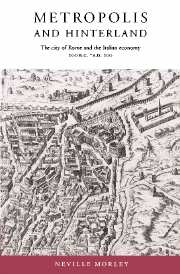Book contents
- Frontmatter
- Contents
- List of maps and figures
- Preface
- List of abbreviations
- Introduction: Rome and Italy
- 1 The metropolitan city in a pre-industrial economy
- 2 The demographic burden
- 3 A model of agricultural change
- 4 The transformation of the Roman suburbium
- 5 Agricultural development in central Italy
- 6 Exploiting the margins
- 7 Marketing and urbanisation
- Conclusion
- Bibliography
- Index
Introduction: Rome and Italy
Published online by Cambridge University Press: 17 August 2009
- Frontmatter
- Contents
- List of maps and figures
- Preface
- List of abbreviations
- Introduction: Rome and Italy
- 1 The metropolitan city in a pre-industrial economy
- 2 The demographic burden
- 3 A model of agricultural change
- 4 The transformation of the Roman suburbium
- 5 Agricultural development in central Italy
- 6 Exploiting the margins
- 7 Marketing and urbanisation
- Conclusion
- Bibliography
- Index
Summary
‘Prima urbes inter, divum domus, aurea Roma.’
(Ausonius, Ordo Urbium Nobilium 1)In praise of Rome
In the summer of A.D. 143, the Greek orator Aelius Aristides arrived in the imperial capital, having made a vow to the gods that, in return for safe passage, he would compose an address in praise of the Roman people:
But, since it was quite impossible to pledge words commensurate with your city, it became evident that I had need of a second prayer. It is perhaps really presumptuous to dare undertake an oration to equal such majesty in a city … For it is she who first proved that oratory cannot reach every goal. About her not only is it impossible to speak properly, but it is impossible even to see her properly … For beholding so many hills occupied by buildings, or on plains so many meadows completely urbanised, or so much land brought under the name of one city, who could survey her accurately? And from what point of observation?
The inability of the orator and of oratory to do justice to the subject is a standard part of the prolegomenon to any panegyric, but Rome inspired similar reactions in other visitors. The emperor Constantius, visiting the city in A.D. 357, is said to have ‘complained of Fama as either incapable or spiteful, because while always exaggerating everything, in describing what there is in Rome, she becomes spiteful’; one of his companions meanwhile remarked that ‘he took comfort in this fact alone, that he had learned that even there men were mortal’.
- Type
- Chapter
- Information
- Metropolis and HinterlandThe City of Rome and the Italian Economy, 200 BC–AD 200, pp. 1 - 12Publisher: Cambridge University PressPrint publication year: 1996

